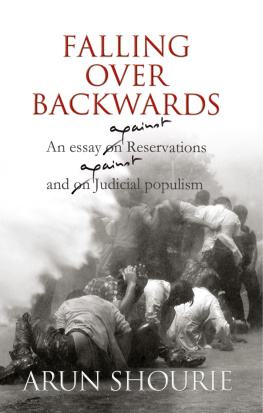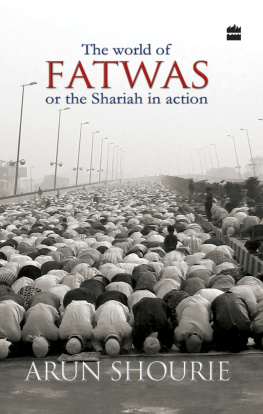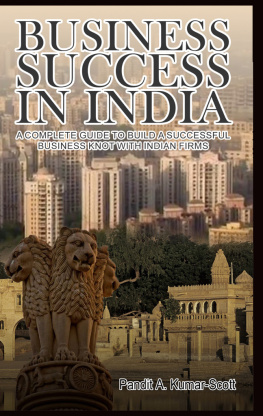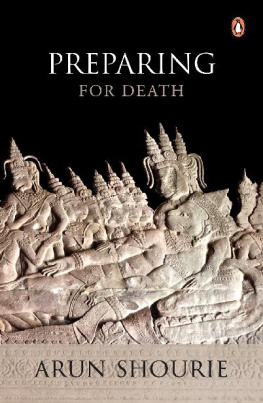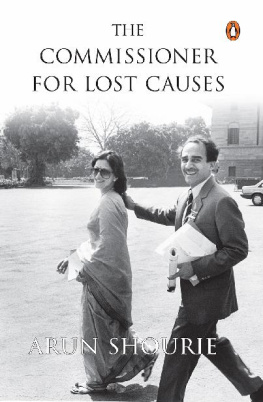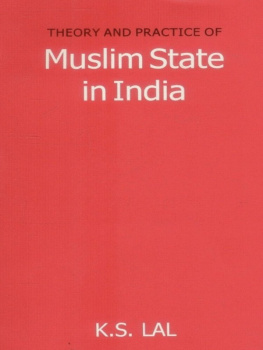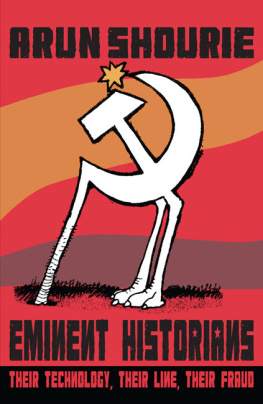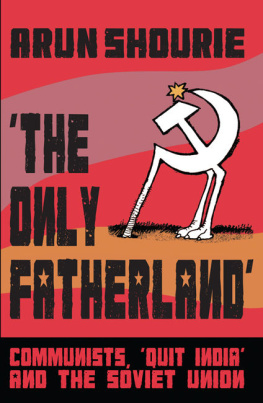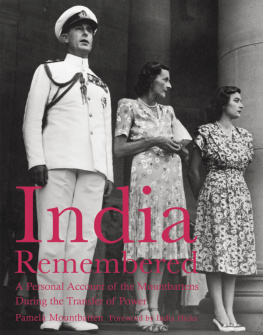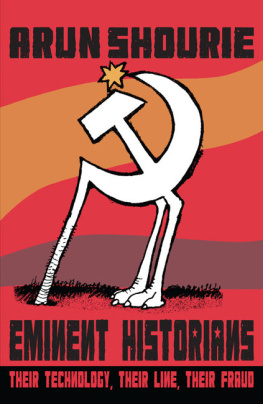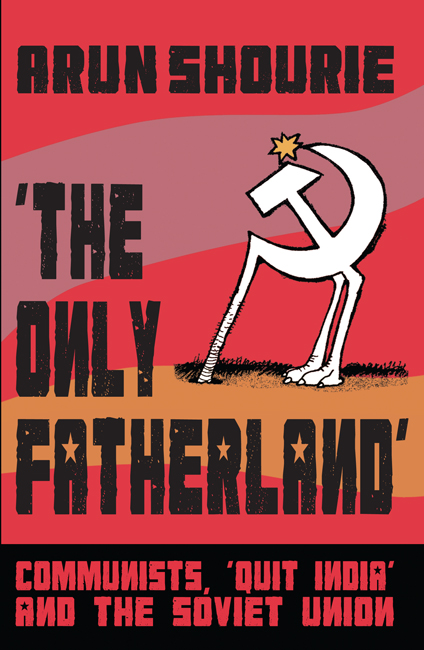
THE ONLY FATHERLAND
Communists, Quit India and
the Soviet Union
ARUN SHOURIE

HarperCollins Publishers India
For our Adit again
who puts up with so much
with such nobility
and fortitude
Contents
Also by Arun Shourie with HarperCollins
Does He Know a Mothers Heart?: How Suffering
Refutes Religions
The World of Fatwas: Or the Shariah in Action
Worshipping False Gods: Ambedkar, and the Facts
Which Have Been Erased
Falling over Backwards: An Essay Against Reservations
and Against Judicial Populism
Self-Deception: Indias China Policies:
Origins, Premises, Lessons
T o every question our communists have an answer. The answer accords with a line. The line they say flows directly from a theory. It is a Master Theory of course, a Revelation they would say, if only they could bring themselves to use the word.
If your answer does not accord with their line, they come down on you as an avalanche of denunciation, of vicious abuse, of their sudden discoveries about your motives. If your answer does not accord with their line is in fact too optimistic. For their line changes often, as often as their convenience. Actually, it changes even more often: it changes as often as their perception of their convenience changes. And that is at least every few years. Hence, the sentence really should begin, If your answer does not accord with their line of the moment
The line as well as its revisions are of course only for the furtherance of the Revolution, of the Emancipation of Man. Obviously therefore, when your answer deviates from their line, they show no mercy. In the interest of Man, of the Future, they cannot.
Nothing I had done or written had attracted any adverse notice of the established communist parties till late 1983. On the contrary, on a visit to Cochin I was invited to the office of one of the principal publications of the CPI(M) in Kerala. Several office-bearers of the party and some journalists connected with it were kind enough to be present. I was told that a well-known editor, who was a senior member of the CPI(M) in Kerala and was present, had laboured long and hard to translate a book of mine, Hinduism: Essence and Consequence. This was the first I had heard of the translation. The book had dealt with the explanation of suffering in our scriptures and with the difficulty of deriving the case for socially relevant action from the world view they contained. The persons present were generous in their expressions about the book, so much so that they did not pay much heed to my saying that the book had been written at a time of great personal tragedy, that I had grown out of much that I had written in it. I was informed that the translation was in fact almost ready to go to press. It was a warm and pleasant visit.
Early in 1984 Mr V.M. Tarkunde asked me to deliver the M.N. Roy Memorial Lecture for the year. I had been planning to do a book alas! the heap of notes still stares at me on Indian liberals and communists about how the former were unduly defensive, almost apologetic in their dealings with the latter; about how the latter had a purely instrumental view of the former. A chapter in it was to set out how the communists ideology had become a set of blinkers and how it had led them into adopting positions that were totally unjustifiable, how it had made them so very cynical of everyone else, in particular of liberals. That they had become skilful in rationalizing whatever they did from the history they rewrote, from the falsehoods they propagated, to the use they made of others, including their followers and colleagues only compounded the problem: it ensured that their inconsiderateness would go farther, it ensured too that they would persist in an error longer. This facility in rationalizing owed and owes much to native talent of course many of the communists had in a sense been among the brightest and the best. But the presumptuousness of that millenarist ideology more than anything else is what produces the rationalizations.
I had selected the Communist Party of Indias 180 degree turn in 1942 to illustrate the matter. In studying it I was greatly helped by the staff of the National Archives, who allowed me to read the files of the period, and by Mr Sita Ram Goel, who loaned me his collection of communist publications. As my reading on this bit had progressed farther than on the other chapters, I sought Mr Tarkundes permission to choose that episode as the subject for the Roy Lectures.
Pritish Nandy, the editor of The Illustrated Weekly of India, was kind enough to carry the lectures barring passages which dealt with details in the Weekly. He carried them with the flair and aplomb which are his hallmark.
The denunciation and abuse and pasting of motives commenced at once. And they were a torrent.
It is an old canard, both the communist parties, their intellectuals, their journalists shouted. But how did that affect its significance or veracity?
He has not established the authenticity of his so-called documents, they shouted. And simultaneously, There is nothing new. The documents have all been published earlier.
He has paid no attention to the world situation which necessitated the new line, they said. And simultaneously, The Party has already, and long ago, acknowledged the error.
Pamphlets were printed in several languages. Press conferences were addressed. The plan to publish the translation of Hinduism by the CPI(M) luminary and editor was aborted. The senior ideologue of the CPI(M) sent a turgid reply to the Illustrated Weekly which at great length dealt with nothing that I had said.
E.M.S. Namboodripad, the general secretary of the CPI(M), led the pack. He declared that I was an agent of the right, that I had resurrected this old canard as the forces of which I was a mouthpiece had been unnerved by the growing strength of progressive and secular forces. It was the timing which was important, he said: I had done all this in view of the elections which were round the corner.
A torrent of falsehood from the fact that no elections were round any corner to the fact that there was nothing selective about the date: the lectures had been delivered as they are every year on M.N. Roys birth anniversary.
As the abuse was so much to form, and as the traducers had found no specific fault with what I had said, instead of dealing with what they were saying about 1942 I was led to write a general essay on the roots of their verbal terrorism, and on what we should do to face it. And as the communists were but a special example, though of course the most virulent one, of a widespread habit, I dealt with them as but an example. The essay was thus a sequel to the lectures. Accordingly, it has been included here after the account of the 1942 episode.
The episode itself remains stuck as a bone in the communists throat. When they were first charged with having worked to sabotage the Quit India movement, they denounced those who had levelled the charge the socialists in particular had levelled it, as hounding them down had been a special target of the collaboration. The communists denounced them most ferociously, and insisted that there had been absolutely no liaison with the British. In his book A History of Indian Freedom Struggle, the English edition of which was published in 1986, E.M.S. Namboodripad however acknowledges the liaison, in the oblique as well as the self-righteous way so characteristic of the communists, in particular of their leading theoreticians. Congress policy was wrong and suicidal, he says. Gandhi had not thought the matter through, he says, and had left no instructions on how the struggle should be carried on in the event of the principal leaders being arrested, he says. The Congress had not prepared for guerilla war against the advancing Japanese, he says. It had not thought of providing medical assistance to the victims of bombing, he says, nor had it thought of mobilizing the masses against profiteers and hoarders. It was the Communist Party which took up these tasks, and accordingly, says Namboodripad, It did not hesitate to establish contact with the government and accept the assistance necessary for carrying out this programme.
Next page

